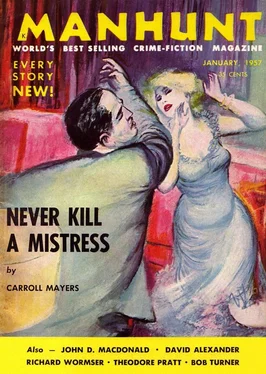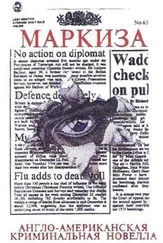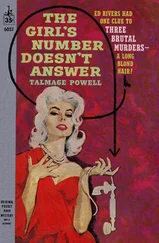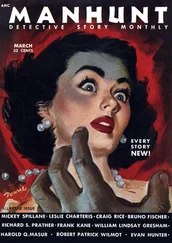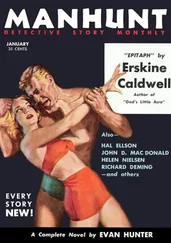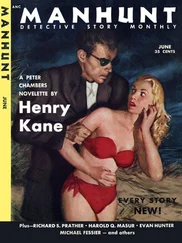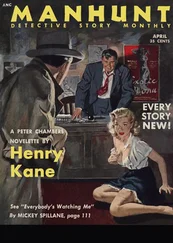Тэлмидж Пауэлл - Manhunt. Volume 5, Number 1, January, 1957
Здесь есть возможность читать онлайн «Тэлмидж Пауэлл - Manhunt. Volume 5, Number 1, January, 1957» весь текст электронной книги совершенно бесплатно (целиком полную версию без сокращений). В некоторых случаях можно слушать аудио, скачать через торрент в формате fb2 и присутствует краткое содержание. Город: New York, Год выпуска: 1957, Издательство: Flying Eagle Publications, Жанр: Детектив, на английском языке. Описание произведения, (предисловие) а так же отзывы посетителей доступны на портале библиотеки ЛибКат.
- Название:Manhunt. Volume 5, Number 1, January, 1957
- Автор:
- Издательство:Flying Eagle Publications
- Жанр:
- Год:1957
- Город:New York
- ISBN:нет данных
- Рейтинг книги:4 / 5. Голосов: 1
-
Избранное:Добавить в избранное
- Отзывы:
-
Ваша оценка:
- 80
- 1
- 2
- 3
- 4
- 5
Manhunt. Volume 5, Number 1, January, 1957: краткое содержание, описание и аннотация
Предлагаем к чтению аннотацию, описание, краткое содержание или предисловие (зависит от того, что написал сам автор книги «Manhunt. Volume 5, Number 1, January, 1957»). Если вы не нашли необходимую информацию о книге — напишите в комментариях, мы постараемся отыскать её.
Manhunt. Volume 5, Number 1, January, 1957 — читать онлайн бесплатно полную книгу (весь текст) целиком
Ниже представлен текст книги, разбитый по страницам. Система сохранения места последней прочитанной страницы, позволяет с удобством читать онлайн бесплатно книгу «Manhunt. Volume 5, Number 1, January, 1957», без необходимости каждый раз заново искать на чём Вы остановились. Поставьте закладку, и сможете в любой момент перейти на страницу, на которой закончили чтение.
Интервал:
Закладка:
Manhunt
Volume 5, Number 1, January, 1957

The Rabbit Gets a Gun
by John D. MacDonald
They were going to kill him. He saw it in their eyes, on their faces ...and there wasn’t a damn thing he could do.

By the time he was ready to stop for the night, the good places were all filled up and he had to settle for a third rate setup — where he was charged five dollars for one of the sour little cabins back up on a slope behind a diner that smelled of grease and sweat.
He had parked beside the cabin, carried in a single suitcase, and now he sat on the sagging bed, looking down at the reflected glare of a naked light bulb on scuffed linoleum. He was full of the tensions and weariness of five hundred miles of driving in heavy relentless traffic. And this, he thought with bitter humor, is the first day of vacation.
When he had explained it to Marian, trying not to see the look of hurt in her eyes, he had imagined it would be very different. “I’ll just throw some stuff in the car, maybe some fishing tackle, and take off. No special destination.”
“But I thought we—”
He interrupted her quickly, saying, “I’ve got to get a chance to think things out.” He didn’t want her to have a chance to remind him that on his vacation he had agreed that they could look for an apartment, perhaps select some furniture, and make other plans for their marriage.
“I didn’t know,” she said carefully, “that you had to think this out, Frank. If you’ve changed your mind, or you want to change your mind, all you have to do—”
“It isn’t that. You know it isn’t that. It’s the job. It’s Aldrich coming in and taking over when I thought they’d give it to me. I thought they’d have to give it to me.”
Yet he knew that, in a sense, he had lied to her — and he knew she was aware of it. It was more than the job. It was her too. And the responsibilities of marriage.
He had thought that as soon as he left the city behind he would begin to think clearly and dispassionately, and he would feel a lift of spirits. But the twin problems had ridden with him throughout the long day. He still felt anger and resentment toward the firm. The least they could have done was give him warning, instead of sending Carl Aldrich in cold. But it was a big outfit, and a rough cold outfit, with branch offices in six states. They made small loans. Frank Lowell had started with them as a credit investigator, and, two years ago at twenty-six, had been made assistant office manager under George Syles. Three months ago George had been promoted to a job in the main offices, and before he left he told Frank in confidence that he had recommended him as new office manager, and it would only be a question of time until it was confirmed.
By then Frank had been going with Marian for eight months. She was a trim and pretty little dark-haired girl who worked in a large law office. They had agreed they would be married. He was confident of the future. They worked out a budget.
Then Carl Aldrich arrived, tall, breezy, confident, smiling — and at least a year younger than Frank. He was properly apologetic about being sent in to take over. He asked for Frank’s loyalty and cooperation. And his sudden arrival turned a promising job into a dead end. It struck a heavy blow at Frank Lowell’s confidence. It made their optimistic budget obsolete.
As he sat on the bed in the grubby cabin, he tried to understand the company’s point of view. He knew his own limitations. People always seemed to have trouble remembering his name and his face. He couldn’t make an impression like Aldrich could. Frank was not quite five foot eight, with sandy complexion, pale blue eyes, a voice that did not carry well. Yet he had felt he made up for his ordinariness by dogged diligence. Under his direction the office loss ratio had been very low, even with the increase in new business. When borrowers were in trouble he had spent evenings with them, working on plans and budgets, explaining in his quiet voice just how it could all be worked out.
Maybe, he thought, it had something to do with the new advertising program in which they tried to personalize their services by putting a picture of the office manager in the newspaper ads. You would think someone in the home office though would be aware of the performance figures of the office, aware of him as a good manager. If it was a dead end job, he did not feel that he could afford to get married. And he knew how hard it would be for him to find another job. Personnel directors were never impressed by him. He remembered how hard it had been getting into the company for which he worked.
He found that he was out of cigarettes. He walked out of the cabin and stood for a time in the night. It was getting cooler. A fragrance of pine woods drifted down the slope. He watched the heavy evening traffic on the highway. Nearly all of the other cabins seemed to be occupied. He walked down the dark slope, stumbling a few times in the ruts of the road, and went into the heat and noise of the diner. A heavy man in a soiled apron stood behind the counter.
Frank walked up to him and said, “Cigarettes?”
The man stared at him with heavy, weary, contempt. He yawned and let the insolent seconds pass and finally said, “The machine, bud. The machine.”
Frank flushed and turned and located the machine. He bought a pack and walked out again into the night. He was too depressed to be very angry. Perhaps the reaction of the fat man was a capsule demonstration of why this job, or any job, would be a dead end. Suppose Aldrich had asked the same question. “Right there behind you in the machine, sir.” Maybe when you have no look or air of importance, all the world treats you with bored contempt, forgetting you the moment you turn away.
So engrossed was he in sour self-analysis that he forgot to count the cabins as he came up the hill. He looked up and saw the familiar contours of his car in the night, faintly illuminated by the cabin light that shone through the side window.
He opened the cabin door and walked in and stopped dead three feet inside the door. There were three people in the room. They all stared at him with identical expressions of shock and alarm. One of them moved very quickly, and Frank Lowell found himself, for the first time in his life, staring at the muzzle of a gun. The man who held it was young. Perhaps nineteen. But his eyes were old and his mouth was cruel and old. He wore khaki pants and he was stripped to the waist. His arms and chest were heavy, muscular and deeply tanned. There was a flag tattooed on his upper arm.
“I told you to lock the door, Stel,” he said. He did not look at the girl as he spoke. She was young, heavy, with a swarthy face, dark brows, hair burned blonde-white by dye.
“Honest I locked it. I turned the key. Honest.”
“So I locked it too,” the other boy said. “We both locked it, Al, so that makes it unlocked.” The other boy was lean, blond, with a narrow face. He wore a T shirt and jeans. The girl wore dungarees and a red shiny shirt too large for her.
“You,” Al said. “Take a step toward me. Fine. Now reach back with your left hand and shut the door.”
As Frank did so, Al moved from the side of the bed. Frank looked at the articles on the bed. Wallets, lighters, jewelry, small wads of money. Al approached him casually, but carefully, stopping three feet away, the gun aimed at Frank’s middle.
Читать дальшеИнтервал:
Закладка:
Похожие книги на «Manhunt. Volume 5, Number 1, January, 1957»
Представляем Вашему вниманию похожие книги на «Manhunt. Volume 5, Number 1, January, 1957» списком для выбора. Мы отобрали схожую по названию и смыслу литературу в надежде предоставить читателям больше вариантов отыскать новые, интересные, ещё непрочитанные произведения.
Обсуждение, отзывы о книге «Manhunt. Volume 5, Number 1, January, 1957» и просто собственные мнения читателей. Оставьте ваши комментарии, напишите, что Вы думаете о произведении, его смысле или главных героях. Укажите что конкретно понравилось, а что нет, и почему Вы так считаете.
